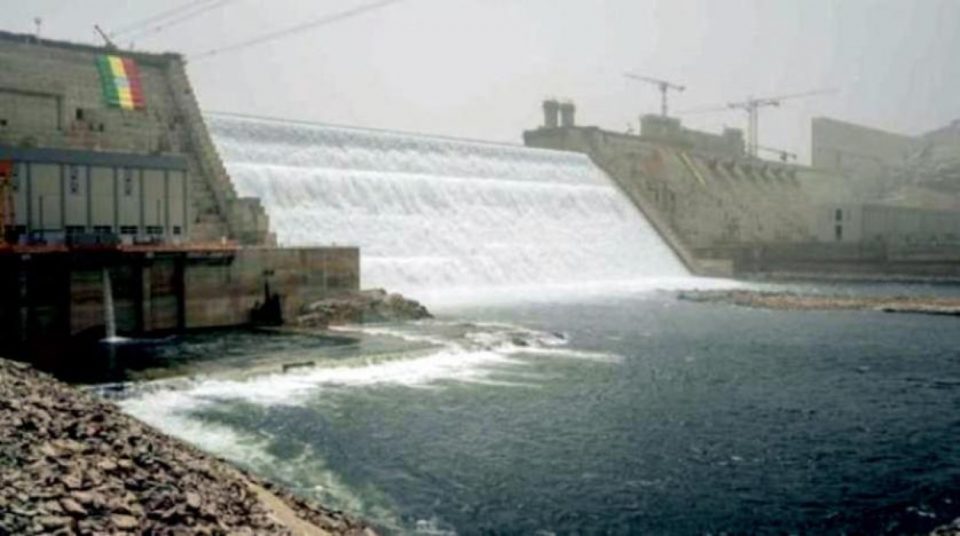By Doaa El-Bey
Tuesday 23 Jul 2024
The fifth filling of the Grand Ethiopian Renaissance Dam has begun against the will of Egypt and Sudan, writes Doaa El-Bey
As the fifth filling of the reservoir behind the Grand Ethiopian Renaissance Dam (GERD) started last week, the issue was one of the topics discussed during Foreign Minister Badr Abdelatty’s meeting with his Sudanese counterpart Hussein Awad. Both officials emphasised their united stand from the GERD file.The issue was also discussed during Abdelatty’s meeting earlier in the week with Bankole Adeoye, Commissioner for Political Affairs, Peace, and Security at the African Union (AU), at a meeting in Accra in Ghana .
The fifth filling started on 17 July, said Abbas Sharaki, professor of geology and water resources at Cairo University, and is expected to conclude in the first week of September.
Like previous fillings, it coincides with the rainy season in Ethiopia, which lasts from mid-July to mid-September.
Sharaki said that over the last few weeks six billion cubic metres (bcm) of water has been released from the dam to allow for heightening the middle wall from 625 to 640 m. As a result, the reservoir is now ready to hold 64 bcm, up from 41 bcm last year.
“The current water flow at the dam is 300 million cubic metres per day, but it will gradually rise to an average of 600 million cubic metres per day in August. Extra quantities will flow above the middle wall and through the saddle dam,” he added.
The filling comes a few days after South Sudan ratified the Nile Basin Cooperative Framework Agreement (CFA), also known as the Entebbe Agreement. There was no official Egyptian reaction to either development.
Sharaki said that the agreement is the outcome of meetings between the upstream Nile states. “It cannot be applied to Egypt and Sudan, the two downstream countries, even if all the other members ratify it,” he said.
The CFA was reached in 2010, more than a decade after the establishment of the Nile Basin Initiative (NBI) whose main objective is to conclude a cooperative framework agreement among all Nile Basin countries.
The CFA outlines basic principles for the protection, sharing, and management of the Nile Basin. However, it ignores Egypt and Sudan’s water rights outlined in previously signed agreements.
Ahmed Al-Mufti, a former member of Sudan’s delegation to the Nile Basin negotiations, described South Sudan’s ratification as “political”.
“It aims to gain Addis Ababa’s and other Nile Basin countries’ support in its negotiations to equally divide Sudan’s present water quota of 18.5 bcm,” he was quoted by the media as saying last week.
Addis Ababa welcomed the step, describing it as “historic” and “paving the way to put the CFA into force”.
“The fully ratified CFA required six riparian countries, which is now fulfilled,” Ambassador Sileshi Bekele, Ethiopia’s chief negotiator on transboundary rivers and the GERD, said, according to news reports.
Ethiopia, Uganda, Rwanda, and Tanzania were the first to sign the CFA in Entebbe in 2010, followed by Kenya, and Burundi.
All the signatories except Kenya subsequently ratified it after it was opened for ratification in 2013. This week, South Sudan, which joined the NBI after independence in 2011, became the sixth nation to ratify it.
The CFA will enter into force 60 days after six countries have ratified or consented to it and have officially deposited their instrument of ratification with the AU.
It has already been rejected by Egypt and Sudan. Both countries have declined to attend most of the NBI meetings held to discuss and later ink the agreement because it denies the rights of the downstream countries and ignores previously signed agreements, describing them as “colonial agreements”.
Both countries have also consistently opposed the dam’s fillings in the absence of a binding agreement on its operation. Cairo fears the process will reduce the flow of Nile water on which Egypt depends, while Sudan is worried that Ethiopia’s unilateral actions and absence of coordination will endanger its own dams.
Ethiopia, however, considers the Egyptian demand for a legally binding agreement to be an encroachment on its sovereignty, claiming that the GERD will not harm Cairo or Khartoum.
The Declaration of Principles signed in Khartoum by Egypt, Ethiopia, and Sudan in 2015 stipulated that the GERD should not cause significant harm to any of the three countries and that they should reach agreement on its operation before any filling of its reservoir.
Ethiopia undertook the fifth filling of the GERD’s reservoir, and all previous fillings, without coordination with Egypt and Sudan, leading to diplomatic tensions. Now the multibillion-dollar project is over 94 per cent complete and nearly full.
Egypt receives about 55.5 bcm of Nile water and Sudan 18.5 bcm.
Egypt, already suffering from severe water shortages, depends on the Nile for its water supply. Its per capita supply of water stands at 550 cubic metres annually, well below the internationally recognised threshold for water scarcity of 1,000 cubic metres per person.

